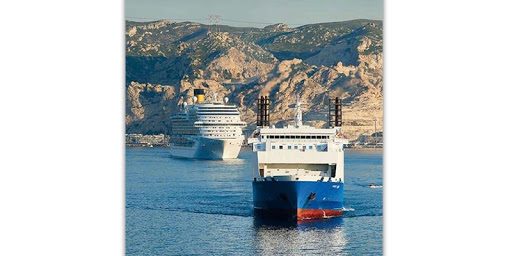Following a successful presentation in the 2016 Hellenic Institute of Marine Technology Annual Meeting, (November 2016), our concept of a Ro-Ro/Passenger ship with Scalable Speed capabilities was featured in the annual MARKET17 issue by SHIPPAX. What follows is an excerpt from the article by Frederik Erdmann:
So far, conversions account for the majority of Kopoukis’ projects. Adequate and solid second-hand vessels providing the basis for skilful conversions have though become increasingly difficult to find – particularly in the range of overall lengths below 150 metres.
On the other hand, the demand for replacement tonnage particularly in this size category remains obvious in various parts of the Mediterranean. Many Greek domestic services require ships below 150 metres in overall length due to restricted island port sizes, but vessels of this category operate for example also between the Italian mainland and Corsica, between Italy and Albania, Italy and Croatia, on Italian domestic lines and on routes between Europe and Morocco.
It therefore came as a logic step for Kopoukis to embark on a newbuilding design project. This process started with a thorough analysis of the market and its demands: “Throughout the Mediterranean and especially here in Greece we have identified a strong seasonal variety of transport demands”, explains Theodore Kopoukis, “during the summer – and especially during a three-month peak season – the demand for passenger transport is high. Ships are booked to capacity, additional roundtrips need to be made, and passengers wish to reach their destination as quickly as possible. During the rest of the year, passenger loads are much lower, cargo dominates and on many routes less roundtrips are required. During the winter months many lines are not profitable at all, and the operators’ focus is clearly on efficiency in order to minimise losses”.
As their conclusion of this analysis, the Kopoukis team found that many Mediterranean operators need a RoPax design able to operate at different speeds: In summer, a relatively high speed around 20 knots is required in order to minimise the travel time and allow an increased frequency of departures.Accordingly, the ‘summer focus’ must be on speed – contrasting to the ‘winter focus’ on fuel economy, which accepts a reduced speed and fewer departures.
A conventional propulsion scheme is, however, unsuitable to achieve such a great speed range. “Accordingly, we started to look for alternative propulsion and a design allowing an extended speed range”, says Theodore Kopoukis, “our intention was to develop a RoPax which could sail at different speeds in different seasons. Moreover we wanted our new RoPax design to be adapted to the austere infrastructure in Greek ports, to be highly manoeuvrable, and as eco-friendly as possible – including the option to apply scrubbers or even LNG as an alternative fuel”.
Finally yet importantly, the Kopoukis-team strived to present a fully developed and feasible design complete with tank model testing of a prototype already done.
The complete article can be found in the MARKET17 issue, by SHIPPAX, available for purchase here







